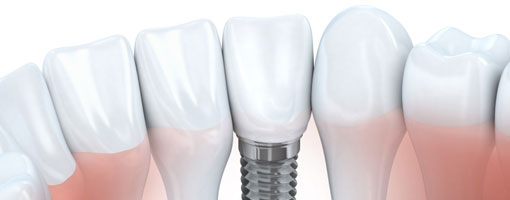What Are Dental Implants?
The field of dentistry has changed dramatically over the past decade. New technology and new materials have made the impossible, possible. This is good news for patients who are looking to replace teeth with dental implants.
Titanium Dental Implants
Swedish scientist Per-Ingvar Branemark observed that titanium could bond with bone back in the early 1950s. He called this process osseointegration.
Since then, systems have been developed that use titanium for dental implant procedures, for tooth root replacement, and other medical applications.
Dental Implants FAQs
Please click on a link below for answers to the most commonly asked questions about dental implants.
-
Are dental implants always successful?
There is a small possibility that the implant and bone will not attach correctly or that an implant will fail after some period of time. If this happens, the implant can be removed and often replaced by another implant.
-
How are the teeth attached to the implant?
After osseointegration has occurred, a minor procedure is performed to expose the top of the implant and attach a small post.
Then the new tooth or teeth are custom designed to fit precisely on top of this post.
-
How long does a dental implant procedure take?
The first procedure, placement of the implants, takes approximately 20 to 30 minutes for each implant.
The second procedure to uncover the implants and attach the abutments usually takes an hour or less depending on the number of implants that you have.
-
How long will it take before I receive my replacement tooth?
The implants should usually be left undisturbed in the jaw for 3 to 6 months for osseointegration to take place.
The new tooth or teeth can then be attached to the implants.
Some of the newer systems, however, allow the teeth to be placed within 2 month. Ask our team for more information on this special type of implant.
-
How much will implant treatment cost?
The actual cost of the procedure will depend on the number of implants necessary, the position of implant placement and the type of replacement teeth that will meet your needs.
All in all, dental implants usually represent a wise investment in overall health and well-being and can provide you with long-term benefits.
Dr. Vaida will be glad to discuss the costs with you at the time of your consultation.
-
How successful are dental implant procedures?
Over thirty years of clinical documentation has proven the success of the cylindrical implant system, with over a half million patients treated.
Cylindrical type implant systems continue to lead the world in dental implant treatment with one of the highest success rates in dentistry.
-
Is the dental implant procedure painful?
If you are like most patients, you will experience no major discomfort during or after the operation.
Dr. Vaida will discuss with you options for anesthesia and plan your procedure accordingly. In general, however, it is done with local anesthesia.
-
Will I be able to chew normally on the implant teeth?
Chewing efficiency should improve after treatment with cylindrical implant systems and, following a brief adaptation period, should be comparable to the chewing efficiency of natural teeth.
-
Will my new tooth or teeth look natural?
Provided you care for your implant properly, it can last for a lifetime.
-
Will there be any swelling after the implant procedure?
This too can vary, but most people experience only minimal swelling. Any that does occur usually ends within one or two days after the procedure.
Dental Implants at Langley's Willowbrook Dental Clinic
While bridges may have to be replaced 2-3 times in one's lifetime, studies show that implants can last for life, thus saving money and time in the long run. For patients with ill-fitting dentures, dental implants can be placed to anchor the denture and prevent it from moving and/or causing discomfort.

